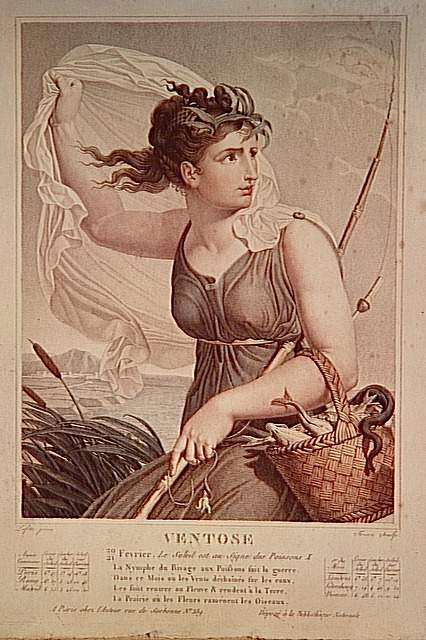The Republican calendar
During the period from 1789 to 1799, France was shaken by a political revolution, doing away with the king and introducing a Republic. This upheaval affected not only the way France was governed; it also changed people's everyday lives. Rule by king was replaced by a Republic on 22 September, 1792. Here government of the country was shared and the privileges of the aristocracy and Christian religion were abolished. All people were said to be equal before the law.
One other wide-reaching change was the government's decision (made on 6 October, 1793) to create a new calendar. And the day when the Republic was proclaimed became the first day of year, namely the autumn equinox, 22 September, 1792, and not 1 January!
Not only were the days, weeks and months renamed, but they were also decimalised. Days were divided up into twenty hours, weeks were made ten days long and called ‘Decades', and there were three, ten-day weeks to a month. Days were renamed primidi, duodi, tridi, quartidi, quintidi, sextidi, septidi, octidi, nonidi and décadi (One-day, two-day, three-day, etc). Given that the year comprised twelve 30-day months, five supplementary days had to be added on after the last month of the year (Fructidor) to make up the full 365/6 days.
For the names of the months, the poet Philippe François Nazaire Fabre, known as Fabre d'Eglantine (1750-1794), took his inspiration from the seasons and the natural changes associated with them. The Republican calendar began with the month of Vendémiaire, the month of the grape harvest, which corresponded to the period from 22 September to 21 October. Then followed the month of Brumaire (the month of fog), Frimaire (the cold month), Nivôse (the month of snow), Pluviôse (the month of rain), Ventôse (the blustery month), Germinal (the month of germination), Floréal (the month of flowers), Prairial (the month of green meadows) and finally Messidor (the month of the harvest), Thermidor (the warm month) and Fructidor (the month of fruits). This is why we refer to the day on which Napoleon took power as the Coup d'Etat du 18-Brumaire an 8 (or year VIII), otherwise known as 9 November 1799 in our calendar.
And the Republicans certainly weren't going to allow the association of saints with the days of the year! Instead, each day of the year was given a name that corresponded with the name of a flower, tree, plant, animal or agricultural tool. Thus the first day of the year, 1 Vendémiaire, was given the name of a fruit: the grape! This was a real headache for the French people who never really got used to it. Napoleon I abolished the Republican calendar with an imperial decree on 9 September 1805 (22 Fructidor an XIII in the Republican calendar). The Gregorian calendar started again on 1 January 1806; the Republican calendar had lasted thirteen years!


